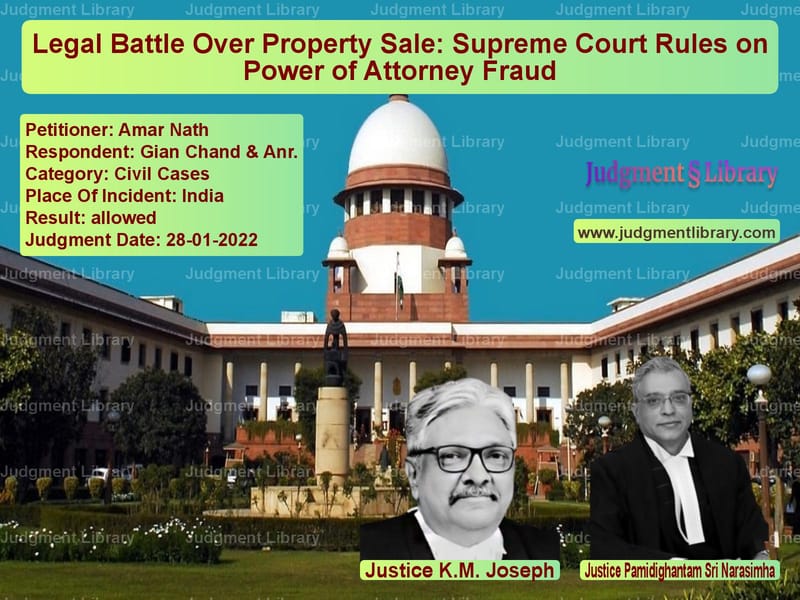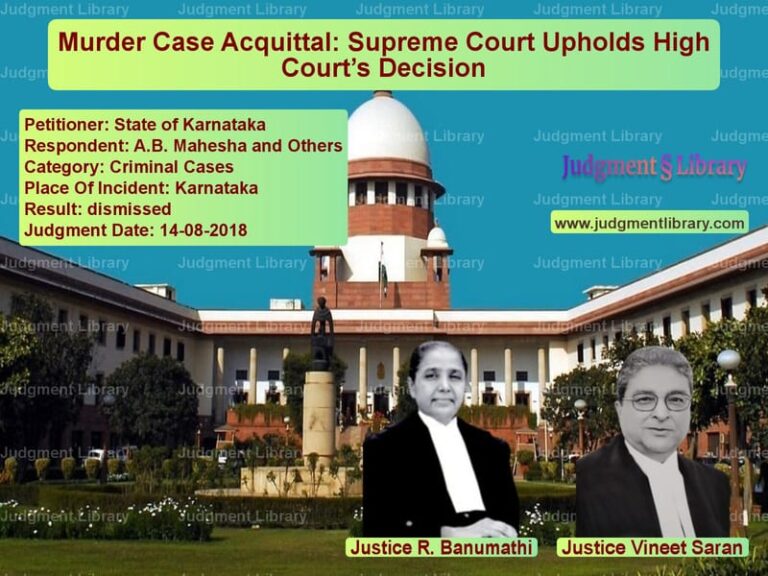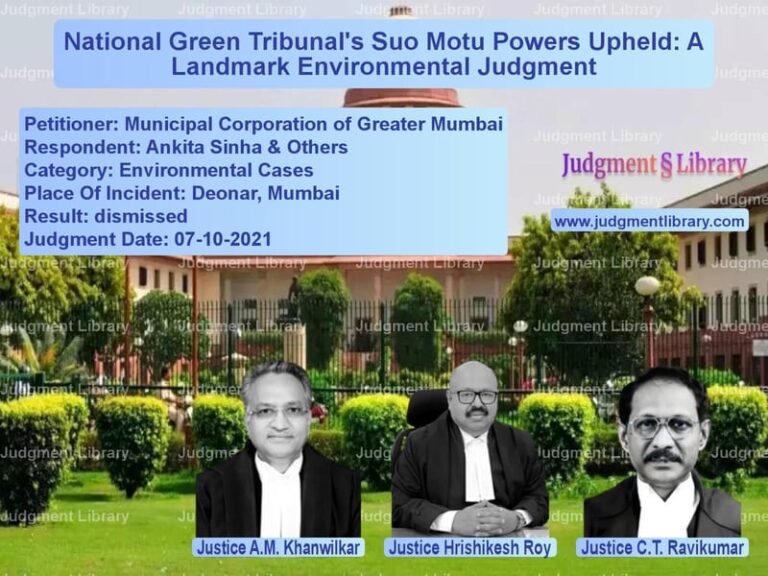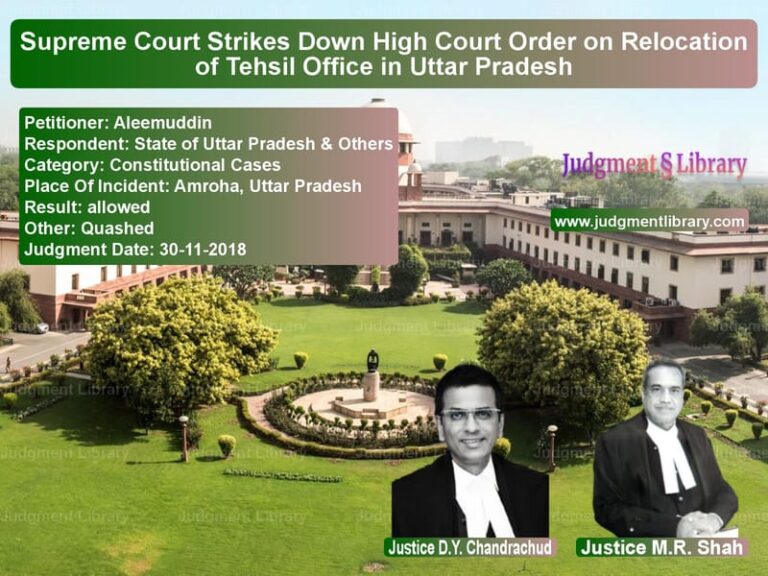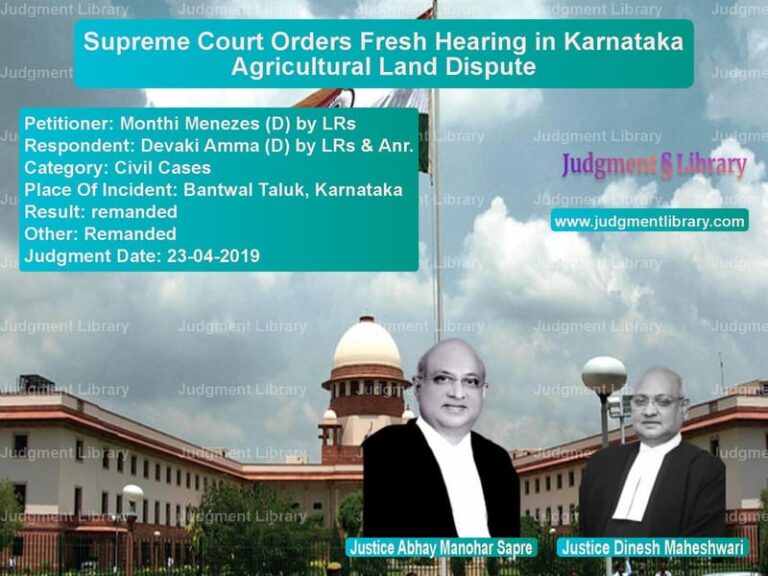Legal Battle Over Property Sale: Supreme Court Rules on Power of Attorney Fraud
The case of Amar Nath v. Gian Chand & Anr. was a complex legal dispute over a property transaction executed through a special power of attorney. The case revolved around allegations of fraud, misrepresentation, and improper execution of a sale deed. The Supreme Court’s judgment examined whether the sale was valid under the Registration Act and the Indian Contract Act, ultimately overturning the High Court’s decision and ruling in favor of the appellant.
Background of the Case
The dispute involved a piece of land measuring 2 Kanals and 10 Marlas, originally owned by the plaintiff (Gian Chand). The plaintiff, who was a junior engineer, had executed a special power of attorney in favor of the second defendant (Yash Pal Singh), authorizing him to sell the land on his behalf. However, the plaintiff later claimed that the power of attorney had been canceled before the sale was executed, making the transaction fraudulent.
The first defendant (Amar Nath) claimed that he had entered into a valid oral agreement with the plaintiff to purchase the land for Rs. 30,000. The plaintiff, however, contended that the agreement was for Rs. 55,000 and that the sale was executed fraudulently by the second defendant without his consent.
Arguments of the Petitioner (Amar Nath)
- The power of attorney was valid at the time of execution of the sale deed.
- The plaintiff had willingly given the power of attorney, authorizing the second defendant to sell the property at any price.
- The sale deed was executed in good faith, and the full consideration of Rs. 30,000 was paid in two installments.
- The plaintiff’s claim of cancellation of the power of attorney was false and had no legal validity.
- The High Court had wrongfully reappreciated the evidence in a second appeal, which was beyond its jurisdiction under Section 100 of the Code of Civil Procedure (CPC).
Arguments of the Respondent (Gian Chand)
- The power of attorney was revoked on February 2, 1987, when the second defendant returned the original document.
- The sale deed was executed fraudulently using a copy of the power of attorney, despite its cancellation.
- The sale consideration was supposed to be Rs. 55,000, but the sale deed was executed for Rs. 30,000 without the plaintiff’s consent.
- The High Court correctly intervened to rectify the injustice caused by the trial and appellate courts.
- Under Sections 32, 33, and 34 of the Registration Act, the registration of the sale deed was invalid as the original power of attorney was not produced.
Key Observations of the Supreme Court
1. Legality of the Sale Deed
The Supreme Court noted that the power of attorney explicitly authorized the second defendant to sell the property at any price. The power of attorney stated:
“I authorize him that he may sell the above said land to whoever he wants to, and at whatever price.”
The Court observed that this clause did not impose any restriction on the agent regarding the sale price.
2. Validity of the Power of Attorney
The plaintiff claimed that the power of attorney was revoked when the second defendant returned the original document on February 2, 1987. However, the Supreme Court found that there was no formal or legal cancellation. The Court held:
“A registered power of attorney cannot be canceled merely by writing ‘canceled’ on the document. A proper legal process is required.”
The Court also referred to Section 208 of the Indian Contract Act, which states:
“The termination of the authority of an agent does not, so far as regards third persons, take effect before it becomes known to them.”
3. Fraud and Misrepresentation
The High Court had ruled that the sale deed was fraudulent. However, the Supreme Court disagreed, stating that the plaintiff himself had written a letter to the second defendant on June 2, 1987, asking him to arrange for a buyer and send money:
“You please inform at the earliest if you can talk to anyone or have talked to anyone then kindly send the money because I am in dire need of money.”
The Court found that this letter contradicted the plaintiff’s claim that the power of attorney was canceled before the sale.
4. Applicability of Section 34 of the Registration Act
The plaintiff argued that under Section 34 of the Registration Act, the original power of attorney had to be produced at the time of registration. However, the Supreme Court held that:
“When an agent executes a document under the terms of a power of attorney, he is, for registration purposes, the actual executant. The production of the original power of attorney is not mandatory.”
5. Jurisdiction of the High Court
The Supreme Court criticized the High Court’s intervention in the case, stating:
“The High Court has overstepped its jurisdiction by reappreciating evidence in a second appeal. Under Section 100 CPC, a second appeal can only be entertained on a substantial question of law.”
The Court ruled that the High Court’s interference in factual findings was unwarranted.
Final Judgment
The Supreme Court set aside the High Court’s decision and reinstated the findings of the trial and appellate courts. The key takeaways from the judgment are:
- The power of attorney was valid at the time of the sale, and its cancellation was not legally established.
- The sale deed was executed lawfully, and there was no evidence of fraud.
- The production of the original power of attorney was not necessary for the registration of the sale deed.
- The High Court had erred in reappreciating the evidence and interfering in factual findings.
The judgment reinforces the principle that courts should not interfere in factual matters in a second appeal unless there is a substantial question of law. It also highlights the importance of legally valid cancellation of power of attorney to prevent disputes in property transactions.
Petitioner Name: Amar Nath.Respondent Name: Gian Chand & Anr..Judgment By: Justice K.M. Joseph, Justice Pamidighantam Sri Narasimha.Place Of Incident: India.Judgment Date: 28-01-2022.
Don’t miss out on the full details! Download the complete judgment in PDF format below and gain valuable insights instantly!
Download Judgment: amar-nath-vs-gian-chand-&-anr.-supreme-court-of-india-judgment-dated-28-01-2022.pdf
Directly Download Judgment: Directly download this Judgment
See all petitions in Property Disputes
See all petitions in Contract Disputes
See all petitions in Landlord-Tenant Disputes
See all petitions in Specific Performance
See all petitions in Damages and Compensation
See all petitions in Judgment by K.M. Joseph
See all petitions in Judgment by P.S. Narasimha
See all petitions in allowed
See all petitions in supreme court of India judgments January 2022
See all petitions in 2022 judgments
See all posts in Civil Cases Category
See all allowed petitions in Civil Cases Category
See all Dismissed petitions in Civil Cases Category
See all partially allowed petitions in Civil Cases Category

